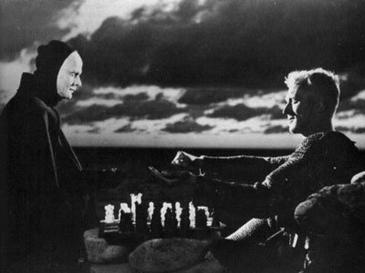Many of Bergman's movies were about a quest for meaning in a modern, meaningless world. Contrary to many other artistic works of the period, Bergman's works have a deeply entrancing meaning that takes much contemplation but (relatively to the other pieces of art) little digging. In looking at Bergman's work, a great example is The Seventh Seal.
In short, the film is about (to quote the book) "a knight who returns home from the Crusades, only to confront widespread plague and human suffering. Disillusioned, he ultimately challenges Death to a game of chess, the stakes of which are life itself." I won't go much further into the storyline, as I think everyone should see the film and I don't want to give TOO much away. However, I'll take a brief look at some of the main themes.
Death is both a character (played here by Bengt Ekerot) and a major theme in the story. It is interesting to see how the various characters treat death throughout the film. While the Knight treats Death as an adversary, the Squire treats Death as if he is nothing more than a huge joke. Other characters react in fear or acceptance. It is interesting to see all of these viewpoints, knowing that this film came out less than 15 years after World War II. Man had not dealt with death in that capacity since the Black Plague, which is occurring during this film. Regardless of how one feels about Death, though, everyone will dance with him eventually.
Another theme is the silence of God (I disagree with the book calling it the "loss of God," though that was how some viewed it in that time period and even into the current one). The scene that sums this up for me is posted below.
I don't think I've ever seen greater expression of doubt or desire for God.
"Is it so cruelly inconceivable to grasp God with the senses? Why should He hide himself in a mist of half-spoken promises and unseen miracles?...What is going to happen to those of us who want to believe but aren't able to?"
"Faith is a torment – did you know that? It is like loving someone who is out there in the darkness but never appears, no matter how loudly you call."
It is understandable for the Knight to be asking these questions during the Plague, much like it is understandable for Bergman to be asking the questions following World War II. It is an incredible view to have such stark insight into and personally hits me, because I knew how it felt when I asked some of those questions in the past. Bergman is an incredibly influential and expressive director and was perfect for his time and place and will continue to be perfect for as long as man remains what he is now.


_01.jpg)
